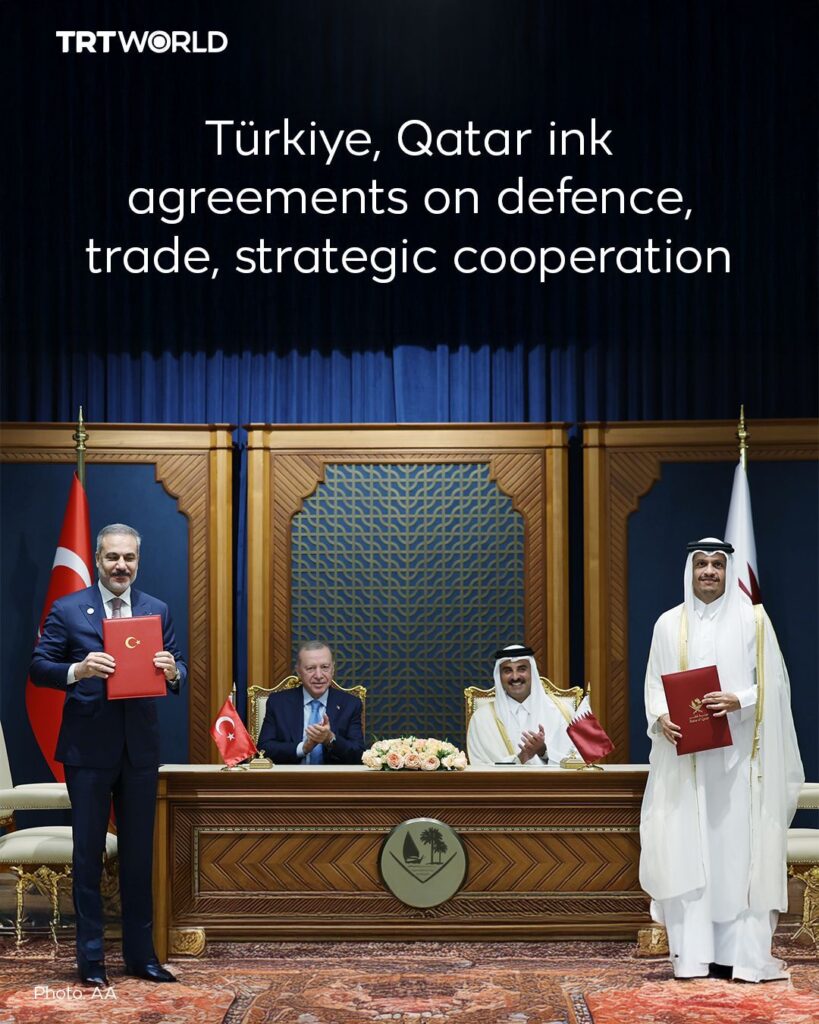Source : TRT World
DOHA Oct 22, 2025 – Turkish President Recep Tayyip Erdogan and Qatari Emir Sheikh Tamim bin Hamad Al Thani sealed a raft of pacts on Wednesday, bolstering defense ties, trade flows, and strategic planning during the 11th Türkiye-Qatar High Strategic Committee meeting in the Gulf state’s sun-baked capital. The accords, signed amid Erdogan’s whirlwind three-day Gulf tour, underscore Ankara’s bid to deepen alliances in a volatile region, from Gaza’s bloodshed to Syria’s fragile rebound.
The high-level huddle—co-chaired by the two leaders in a wood-paneled hall adorned with national flags and a palm-embossed emblem—capped discussions on bilateral bonds and thornier global flashpoints. Four key documents exchanged hands, witnessed by the dignitaries: a joint declaration on the committee’s outcomes, a memorandum on sharing expertise in strategic development planning, a ministerial statement to juice trade volumes, and a defense industry cooperation pact. Turkish Foreign Minister Hakan Fidan and his Qatari counterpart, Sheikh Mohammed bin Abdulrahman Al Thani, inked the overarching declaration, while sector-specific signatories included Finance Minister Mehmet Simsek, Trade Minister Omer Bolat, and Defense Industry Agency head Haluk Gorgun.
Erdogan hailed the partnership as a “significant contribution to regional and global stability,” vowing to supercharge existing gains in military collaboration, energy ventures, and investments. “Türkiye aims to further enhance its excellent relations with Qatar, which currently shows progress at an outstanding level,” he said in a statement from Ankara’s Communications Directorate, spotlighting the duo’s role in everything from joint arms production to humanitarian aid pipelines. The defense MoU, in particular, eyes deeper tech transfers and joint projects, building on Qatar’s stake in Turkish drone makers like Baykar and a $3 billion loan lifeline during Ankara’s 2018 currency crunch.
Trade talks took center stage too, with the joint statement paving the way for streamlined customs and market access—vital as two-way commerce hit $2.6 billion last year, skewed heavily toward Turkish exports of machinery and steel. Strategic planning got a boost via the development MoU, touching energy grids, transport links, and even Syria-focused relief, where Erdogan pledged Qatari teamwork on reconstruction “in all areas, including energy, transportation, and humanitarian assistance.”
The Doha sit-down, Erdogan’s second Gulf pitstop after an unconfirmed opener, doubled as a forum for Middle East peacemaking. On Gaza, the president reiterated a “two-state solution remains the only viable resolution to the Israeli-Palestinian conflict,” urging a ceasefire to ease Palestinian suffering. Qatar, a key mediator in Hamas talks and host to the group’s political wing, nodded along, with Emir Al Thani’s team emphasizing “shared interests, defense self-reliance, and an independent foreign policy” in a nod to rising West Asian tensions.
Ankara’s Gulf charm offensive arrives as Turkey eyes post-election economic lifelines and military export booms—its defense sector raked in $5.5 billion in sales last year, with Doha a top buyer. Critics at home whisper of overreach, but supporters see it as a masterstroke against isolation. As Erdogan jets to Oman next, these inkings signal not just deals, but a blueprint for a more intertwined Sunni powerhouse axis in an era of flux.

